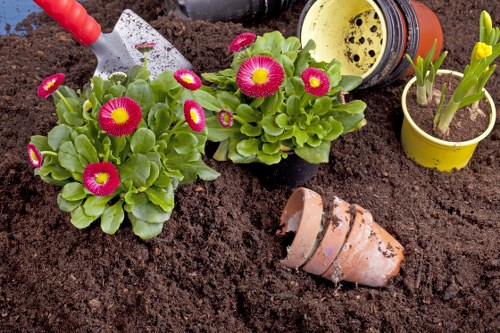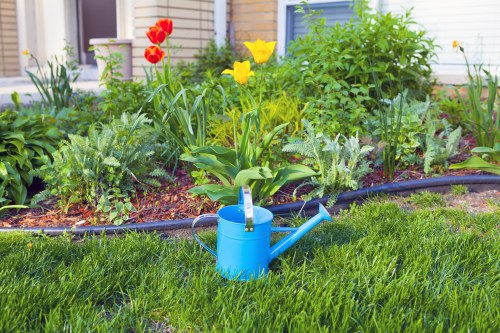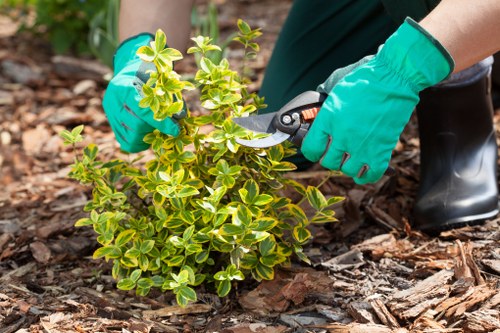Garden Maintenance in Regents Park
Importance of Regular Garden Maintenance

Maintaining a garden in Regents Park is not only a matter of aesthetic appeal but also crucial for the health and sustainability of your outdoor space. Regular garden maintenance ensures that plants remain healthy, pests are controlled, and the overall environment is conducive to growth. Without consistent care, gardens can quickly become overgrown, leading to a decline in plant health and a less inviting outdoor area.
In addition to enhancing the beauty of your home, a well-maintained garden can significantly improve the property's value. Prospective buyers often look for gardens that are well-kept, as they represent additional living space and a place for relaxation. A vibrant garden with diverse plant life can make your property stand out in the real estate market.
Moreover, regular maintenance helps in early detection of issues such as plant diseases or pest infestations, allowing for timely interventions that can save time and resources in the long run. Addressing problems promptly prevents them from escalating, ensuring that your garden remains a healthy and thriving space throughout the year.
Beyond aesthetics and property value, garden maintenance contributes to environmental benefits. A well-tended garden can support local wildlife, including pollinators like bees and butterflies, which are essential for the ecosystem. Additionally, healthy plants contribute to improved air quality by absorbing carbon dioxide and releasing oxygen.
Promoting Plant Health and Longevity

Proper garden maintenance involves a series of tasks aimed at promoting the health and longevity of plants. This includes watering, pruning, fertilizing, and ensuring that plants receive adequate sunlight and nutrients. Each of these tasks plays a vital role in the overall well-being of your garden.
Watering is a fundamental aspect, as both under-watering and over-watering can be detrimental to plant health. Understanding the specific water needs of different plant species is essential for their growth. Implementing an efficient irrigation system can help provide consistent moisture levels, reducing the risk of plant stress and disease.
Pruning not only helps in shaping plants but also in removing dead or diseased branches that can hinder growth or attract pests. Regular pruning encourages stronger and more resilient plant structures, promoting better airflow and sunlight penetration. This practice also helps in controlling the size of plants, preventing them from becoming unruly or invasive.
Fertilizing is another critical component of garden maintenance. Providing the right nutrients at the right time supports plant growth and enhances their ability to resist diseases and pests. Organic fertilizers can improve soil health by adding essential minerals and promoting beneficial microbial activity, leading to a more robust and sustainable garden ecosystem.
Ensuring that plants receive adequate sunlight is also paramount. Different plants have varying light requirements, and proper placement within the garden can make a significant difference. Monitoring light exposure and adjusting plant locations as needed helps prevent issues like sunburned foliage or insufficient growth, ensuring that each plant thrives in its designated spot.
Enhancing Aesthetics and Curb Appeal

An aesthetically pleasing garden adds significant curb appeal to your home. Well-maintained flower beds, neatly trimmed hedges, and vibrant plant arrangements can transform the look of your property. Thoughtful garden design and maintenance create a welcoming atmosphere that reflects your personal style and enhances the overall appearance of your home.
Using a variety of plants with different textures, colors, and heights can create visual interest and depth in your garden design. Incorporating elements like pathways, garden ornaments, and lighting can further enhance the beauty of your outdoor space. These features not only contribute to the garden's aesthetics but also provide functional benefits, such as guiding visitors through the space and highlighting key areas during nighttime.
In addition to flowers and shrubs, incorporating hardscaping elements such as patios or pergolas can provide functional spaces for outdoor activities while adding to the garden's overall appeal. These structures offer opportunities for relaxation, dining, and entertaining, making your garden a versatile extension of your living space.
Seasonal color changes offered by various plants can keep your garden looking fresh and vibrant throughout the year. Planning for seasonal blooms ensures that there is always something in bloom, maintaining visual interest and vitality in your garden across different seasons.
Seasonal Garden Care in Regents Park

Garden maintenance varies with the changing seasons. Each season presents unique challenges and opportunities for garden care in Regents Park. Adapting your maintenance routine to the seasonal climate ensures that your garden remains healthy and vibrant all year round.
Spring is a time for planting new growth, pruning perennial plants, and preparing garden beds for the upcoming bloom. This season marks the revival of plant life after the dormancy of winter, making it an ideal time to introduce new plants and rejuvenate existing ones. Spring cleaning involves removing debris, applying mulch, and ensuring that soil conditions are optimal for plant growth.
Summer requires diligent watering, pest control, and regular mowing to keep the garden looking its best during the hotter months. Heat stress can affect plant health, so implementing efficient watering practices and providing shade to sensitive plants is essential. Monitoring for pests and diseases becomes more critical in preventing widespread issues that can damage the garden.
Autumn is the season for cleanup and preparation for the colder months. Trimming back perennials, removing fallen leaves, and protecting vulnerable plants from frost are key tasks. Preparing the garden for winter involves ensuring that soil remains fertile and that plants have adequate protection against harsh weather conditions.
Winter garden maintenance includes covering vulnerable plants, maintaining tools, and planning for the spring garden layout. While plant growth slows down, ongoing care ensures that the garden is ready to thrive when warmer weather returns. This season is also an opportunity to reflect on the past year's garden performance and plan improvements for the future.
Autumn Cleanup and Preparation

As autumn arrives, trimming back perennials and removing fallen leaves are essential tasks. This cleanup not only enhances the appearance of your garden but also prevents the buildup of debris that can harbor pests and diseases. Clearing fallen leaves allows sunlight to reach the soil, promoting healthier growth in spring.
Winterization involves protecting plants from frost and ensuring that soil remains fertile for the next planting season. Applying mulch can help insulate plant roots against temperature fluctuations, while covering delicate plants provides an extra layer of protection. Proper winter preparation safeguards your garden's health, enabling a robust start in the spring.
Additionally, autumn is an ideal time to assess and repair garden structures such as fences, trellises, and irrigation systems. Addressing any damages or wear and tear ensures that these structures are in good condition, ready to support your plants and garden layout in the coming year.
Planning for next year’s garden during autumn allows you to consider new plant varieties, garden designs, and maintenance strategies. This forward-thinking approach ensures continuous improvement and innovation in your garden care practices, leading to a more beautiful and resilient garden.
Winter Garden Protection
Winter garden maintenance is crucial for protecting your plants and ensuring they emerge healthy in the spring. This involves several protective measures tailored to the specific needs of your garden.
- Mulching: Applying a layer of mulch around plants helps retain soil moisture and regulates temperature, protecting roots from freezing and thawing cycles.
- Covering Plants: Using frost cloths or blankets to cover sensitive plants shields them from extreme cold and frost damage. This is particularly important for annuals and tender perennials.
- Pruning: Performing light pruning on deciduous trees and shrubs in winter can promote healthier growth in the following seasons. However, avoid heavy pruning as it can stress the plants during their dormant period.
- Tool Maintenance: Cleaning and storing garden tools properly prevents rust and extends their lifespan, ensuring they are ready for use in spring.
By implementing these protection strategies, you can safeguard your garden against harsh winter conditions, ensuring that your plants remain healthy and ready to thrive once warmer weather returns.
Winter is also a time for reflecting on the past gardening season, evaluating what worked well, and identifying areas for improvement. This assessment helps in making informed decisions and adjustments for the upcoming year’s garden plans.
Essential Garden Maintenance Services
Professional garden maintenance services in Regents Park offer expertise and efficiency in managing your outdoor space. These services can be tailored to meet the specific needs of your garden, ensuring that every aspect is well cared for.
Services typically include lawn care and mowing, where professionals ensure that your grass is kept at an optimal length, promoting healthy growth and a neat appearance. Regular mowing prevents weeds from taking over and maintains a uniform look across your lawn.
Pruning and trimming services help maintain the shape and health of trees and shrubs, while weeding and mulching help suppress unwanted plants and retain soil moisture. These tasks are essential for preventing overgrowth and maintaining the structural integrity of your garden elements.
Additionally, professional services may offer soil testing and fertilization, ensuring that your plants receive the necessary nutrients for optimal growth. Proper soil management enhances plant health and productivity, leading to a more vibrant and resilient garden.
Other services include pest and disease control, where experts identify and address infestations or infections that could harm your plants. Timely intervention prevents minor issues from escalating into severe problems that can devastate your garden.
Lawn Care and Mowing
Lawn care is a fundamental aspect of garden maintenance that requires regular attention. A healthy lawn not only enhances the beauty of your garden but also provides a lush, green space for outdoor activities and relaxation.
Professional lawn care services include mowing, which keeps grass at an optimal height, promoting dense growth and minimizing the chance of weeds establishing themselves. Regular mowing also prevents the grass from becoming too long and unmanageable, maintaining a neat and tidy appearance.
In addition to mowing, lawn care involves fertilizing to supply essential nutrients that support robust growth. Fertilizers help in strengthening the grass, making it more resistant to drought, pests, and diseases. Proper fertilization leads to a greener, thicker lawn that can better withstand environmental stresses.
Aeration is another key lawn care service that improves soil health by allowing air, water, and nutrients to penetrate the grass roots. This process enhances root development and overall lawn resilience, contributing to a healthier and more vibrant lawn.
Finally, addressing weed control and pest management ensures that unwanted elements do not compromise the health and appearance of your lawn. Professional services use effective and environmentally friendly methods to manage weeds and pests, maintaining the integrity of your lawn without causing harm to the surrounding environment.
Pruning and Trimming
Pruning and trimming are essential tasks for maintaining the health and appearance of trees, shrubs, and other plants in your garden. These practices involve selectively removing specific parts of a plant to encourage healthy growth and prevent overgrowth.
Pruning involves cutting back branches or stems to promote better airflow and sunlight penetration, which are critical for preventing diseases and encouraging fruit or flower production. Proper pruning techniques ensure that plants develop strong structures and maintain their desired shape.
Trimming is focused on maintaining the shape and size of plants, keeping them within the boundaries of your garden design. Regular trimming prevents plants from becoming unruly or encroaching on pathways and structures, ensuring a clean and organized garden layout.
For fruit-bearing trees, pruning is especially important as it directly affects the quality and quantity of the harvest. Removing dead or crossing branches helps in producing healthier and more abundant fruit, enhancing the overall productivity of your garden.
Professional pruning services in Regents Park are skilled in handling a variety of plants, ensuring that each pruning task is performed correctly to benefit the plant's health and aesthetic appeal. Their expertise minimizes the risk of damaging plants, promoting long-term growth and vitality.
Weeding and Mulching
Weeding and mulching are crucial for maintaining a clean and healthy garden environment. Weeding involves the removal of unwanted plants that compete with your desired plants for nutrients, water, and sunlight. Effective weed control prevents the spread of invasive species and maintains the integrity of your garden design.
Mulching serves multiple purposes, including retaining soil moisture, regulating soil temperature, and suppressing weed growth. Applying a layer of mulch around plants helps in creating a stable environment that promotes healthy root development and reduces the need for frequent watering.
Organic mulches, such as bark, straw, or compost, not only provide these benefits but also contribute to improving soil structure and fertility as they decompose. This organic matter enriches the soil, enhancing its ability to support robust plant growth and sustainable garden health.
Mulching also adds aesthetic value to your garden by providing a uniform and finished look to flower beds and planting areas. It ties different elements of the garden together, creating a harmonious and visually appealing landscape.
Regular weeding combined with mulching creates a balanced garden ecosystem where your desired plants can thrive without the constant struggle against invasive weeds, ensuring a lush and well-maintained outdoor space.
Irrigation and Water Management
Effective irrigation is vital for a thriving garden. Professional garden maintenance services can design and implement irrigation systems that provide consistent and efficient watering, reducing water waste and ensuring that plants receive the right amount of moisture.
Water management also involves adjusting irrigation schedules based on seasonal changes and weather conditions, which helps maintain plant health and conserves water resources. By monitoring rainfall patterns and soil moisture levels, irrigation systems can be fine-tuned to meet the specific needs of your garden throughout the year.
Advanced irrigation solutions, such as drip systems or soaker hoses, can further enhance water efficiency and targeted delivery to plant roots. These methods minimize evaporation and runoff, ensuring that water reaches the areas where it's needed most without unnecessary waste.
In addition to irrigation systems, soil health plays a critical role in water management. Well-amended soil with proper drainage improves water retention and reduces the risk of waterlogging, which can harm plant roots and lead to diseases. Regular soil testing and amendments help maintain optimal soil conditions for efficient water usage.
Implementing rainwater harvesting systems can also contribute to sustainable water management practices. Collecting and utilizing rainwater for garden irrigation reduces dependence on municipal water supplies, promoting environmental stewardship and cost savings.
DIY vs. Professional Garden Maintenance
Deciding between DIY garden maintenance and hiring professionals depends on various factors, including the size of your garden, your expertise, and the time you can dedicate to upkeep. Both approaches have their advantages and considerations, and understanding these can help you make an informed decision.
Benefits of hiring professionals include access to specialized knowledge, professional-grade equipment, and the ability to handle complex tasks that may be challenging for an average homeowner. Professionals can provide expertise in plant selection, soil management, and pest control, ensuring that your garden receives comprehensive care.
Additionally, professional services save you time and effort, allowing you to enjoy your garden without the physical demands of maintenance tasks. This is particularly beneficial for large gardens or for individuals with busy schedules who may find it difficult to keep up with regular upkeep.
On the other hand, DIY garden maintenance can be cost-effective and fulfilling for those who enjoy hands-on gardening and have the necessary time and skills. DIY enthusiasts often find satisfaction in nurturing their plants and designing their garden spaces, fostering a personal connection with their outdoor environment.
However, DIY maintenance requires a certain level of knowledge and commitment. Mistakes in planting, pruning, or pest management can lead to plant stress or damage, requiring corrective measures. Investing time in learning best practices and staying informed about gardening techniques is essential for successful DIY maintenance.
Benefits of Hiring Professionals
Hiring professional garden maintenance services in Regents Park offers numerous benefits that can enhance the health and beauty of your garden. Professionals bring a wealth of experience and expertise, ensuring that your garden receives top-quality care tailored to its specific needs.
One of the primary advantages of professional services is their ability to provide comprehensive care for all aspects of your garden. From lawn maintenance and pruning to pest control and soil management, professionals handle a wide range of tasks, ensuring that no detail is overlooked.
Moreover, professionals use specialized equipment and techniques that may not be readily available to DIY gardeners. This access to advanced tools allows for more efficient and effective maintenance, resulting in superior outcomes for your garden.
Another significant benefit is the time-saving aspect. Professionals take the burden of maintenance off your shoulders, freeing up your time to enjoy other activities or simply relax in your beautifully maintained garden without the stress of upkeep.
Additionally, professional garden maintenance services often offer customized plans that cater to your garden’s unique requirements. This personalized approach ensures that each plant receives the appropriate care, promoting overall garden health and longevity.
When to Consider DIY
While professional garden maintenance offers numerous benefits, there are situations where DIY maintenance may be more appropriate or preferable. Consider opting for DIY when:
- You have a small to medium-sized garden that doesn't require extensive maintenance.
- You enjoy gardening and find it a relaxing and rewarding hobby.
- You have the necessary time and resources to commit to regular garden upkeep.
- You want to save on the costs associated with hiring professional services.
- You prefer a hands-on approach to shaping and nurturing your garden according to your personal vision.
DIY maintenance allows for greater flexibility and creativity in managing your garden. It enables you to experiment with different plant arrangements, implement sustainable practices, and develop a deeper understanding of your garden’s ecosystem.
However, it's essential to assess your skills and the demands of your garden realistically. If you find that maintenance tasks are becoming overwhelming or you lack the expertise to address specific issues, it may be time to consider professional assistance to ensure your garden remains healthy and beautiful.
Choosing the Right Garden Maintenance Service in Regents Park
Selecting the right garden maintenance service is crucial for the health and beauty of your garden. Here are some factors to consider:
- Experience and Expertise: Look for service providers with a proven track record and expertise in various aspects of garden maintenance. Experienced professionals are better equipped to handle diverse plant types and unique garden challenges.
- Range of Services: Ensure that the company offers a comprehensive range of services that meet your specific garden needs. A broad service offering indicates versatility and the ability to provide holistic care for your garden.
- Customer Reviews: Positive reviews and testimonials can indicate reliable and quality service. Check online platforms and ask for references to gauge the satisfaction of previous clients.
- Pricing: Compare pricing structures to ensure you receive good value for the services provided. While cost is an important factor, it should be weighed against the quality and scope of services offered.
- Licensing and Insurance: Verify that the service provider is properly licensed and insured. This protects you from potential liabilities and ensures that the company adheres to industry standards and regulations.
- Communication and Responsiveness: Choose a provider that communicates clearly and is responsive to your queries and concerns. Good communication ensures that your expectations are understood and met.
- Sustainability Practices: If environmental responsibility is important to you, consider services that implement sustainable gardening practices, such as using organic fertilizers or eco-friendly pest control methods.
Additionally, ask potential providers about their maintenance plans, scheduling flexibility, and any guarantees they offer to ensure you select a service that aligns with your expectations and garden care goals.
Questions to Ask Potential Providers
- What services are included in your garden maintenance packages?
- Do you have experience with gardens similar to mine?
- What is your pricing structure, and are there any additional fees?
- Can you provide references or testimonials from previous clients?
- How do you handle seasonal maintenance tasks and emergencies?
- What measures do you take to ensure environmentally friendly practices?
- Are your staff trained and certified in gardening and landscaping?
- What is your policy on satisfaction guarantees or follow-up services?
Asking these questions will help you gauge the suitability of the garden maintenance service and ensure that your garden receives the best care possible. It also demonstrates your commitment to maintaining a healthy and beautiful garden, fostering a collaborative relationship with the service provider.
Furthermore, understanding the provider's approach to garden care, including their use of materials and techniques, allows you to align their services with your personal preferences and sustainability goals. Clear and open communication sets the foundation for a successful partnership in maintaining your Regents Park garden.
Conclusion
Maintaining a garden in Regents Park doesn't have to be a daunting task. Whether you choose to manage it yourself or hire professionals, regular maintenance is key to ensuring a thriving, beautiful outdoor space. By understanding the importance of garden care, implementing seasonal maintenance strategies, and selecting the right services, you can enjoy a lush and vibrant garden all year round.
Embrace the beauty and benefits of a well-maintained garden by taking proactive steps in garden care. Prioritize plant health, aesthetics, and sustainability to create an inviting and resilient outdoor environment.
Contact us today to keep your Regents Park garden thriving all year round.
Additional Tips for Garden Maintenance
To further enhance the health and beauty of your garden, consider incorporating these additional tips into your maintenance routine:
- Soil Health: Regularly test your soil to determine its pH levels and nutrient content. Amend the soil as necessary to create an optimal growing environment for your plants.
- Composting: Create a composting system to recycle garden waste and produce nutrient-rich compost that enriches your soil naturally.
- Plant Rotation: Rotate plants annually to prevent soil depletion and reduce the risk of pest and disease buildup.
- Integrated Pest Management: Utilize natural pest control methods, such as introducing beneficial insects or using organic pesticides, to manage pest populations effectively.
- Plant Selection: Choose native plants that are well-adapted to the local climate and soil conditions, reducing the need for excessive watering and maintenance.
- Mulching: Consistently apply mulch to conserve moisture, suppress weeds, and regulate soil temperature, fostering a healthier garden environment.
Implementing these practices not only promotes a healthier garden but also contributes to environmental sustainability, ensuring that your Regents Park garden remains a source of beauty and enjoyment for years to come.
By staying informed about the latest gardening techniques and trends, you can continually improve your garden maintenance strategies, adapting to changing conditions and enhancing your garden’s resilience and appeal.

